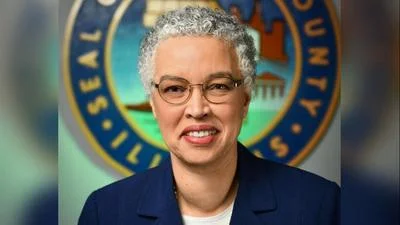Chicago radiologist Dr. Jeffrey Leef, the Republican candidate running for the 7th District U.S. House seat, wouldn’t mind asking his opponent a few pressing questions about why Chicago State University (CSU) is in such dire financial straits.
“It is a shame that the African-American community suffers due to the purposeful withholding of facts, solely to benefit career Democratic politicians and a chosen few,” Leef told West Cook News.
Leef, who has worked at the University of Chicago for 27 years, is running against incumbent Democrat U.S. Rep. Danny Davis, a 1968 CSU alumnus who has held his 7th District U.S. House seat since 1997.
CSU, the state's only public institution serving a predominantly minority, low-income student population, early this year declared a financial emergency and in February sent notices of potential layoffs to all 950 university employees. Since the start of 2016, CSU has laid off almost 400 total employees.
More cuts are expected as faculty contracts run through Aug. 15. In fact, several tenured professors already have taken positions at other higher education institutions, even accepting lower-rung slots just to ensure they’re employed.
Moreover, CSU’s layoffs have cost the university $2.2 million, mostly in severance pay mandated by a school policy that requires up to a year’s notice of being terminated or a payout for the time. For instance, in June, CSU spent roughly $1.6 million on severance for about 50 administrators who received lump-sum payments equal to the salaries they would have received if they hadn’t been fired.
Recently, Davis “came out of hiding” to declare this past Sunday Chicago State University Day, according to Leef, who said the incumbent was seeking support from local churches to help echo his claim that the state's budget crisis and political stalemate are the causes for the school’s financial strife.
That’s bunk, according to Leef, who, similar to many in the GOP, blame the university’s issues on its administrative and faculty bloat.
Leef has some questions he wishes someone would ask Davis.
Do you know that the administrative fees of CSU students ($3,600) are 80 percent higher than all other colleges and universities in the state?
The average MAP (Monetary Award Program) grant per CSU students is $2,600, which amounts to a taxpayer expense of $5.5 million. Do you know that if one-fourth of the administrative staff at CSU were cut, it would not only cover the $5.5 million, but it would leave CSU with an administrative staff number that still would rank first in the state?
Do you know that CSU has nearly one administrator per faculty member?
Do you know there is one administrator per 17.7 students, compared with the state average of 1 per 45?
Do you know that after an average 30-year career, an administrative retiree receives at least $71,000 a year for the rest of his or her life?
Do you know how many of your constituents in the 7th District make or ever have the opportunity to make $71,000 a year?
Why do only 11 percent of CSU students graduate?
A resident of River Forest who describes himself as “a physician by vocation and a politician by necessity,” Leef said he plans to run for a single term.
If he should win, Leef plans to donate a large portion of his salary to charity, including a new diversity department at the University of Chicago, impoverished high schools in the district and to Opportunity Knocks, a nonprofit organization that serves young people with developmental disabilities in Oak Park, Forest Park and River Forest.
Those plans clearly point to the issue the first-time candidate is most passionate about: education.
“Racism reveals its ugly head in many ways," Leef said. "One of the more clandestine is the travesty of which we refer to as the Chicago Public Schools (CPS) system. Children of parents of limited means and the neediest receive the worst education, fewest choices and least opportunities for their children to succeed, all while administrators and teacher salaries and pensions escalate,” Leef said.
And from there, CPS graduates have limited higher education choices and may end up at CSU, which reports a dismal 11 percent graduation rate.
“Chicago State University is just one example of the results of sending children, born behind the eight ball, out into the world without the skills, training and education that others more fortunate receive,” Leef said.






 Alerts Sign-up
Alerts Sign-up